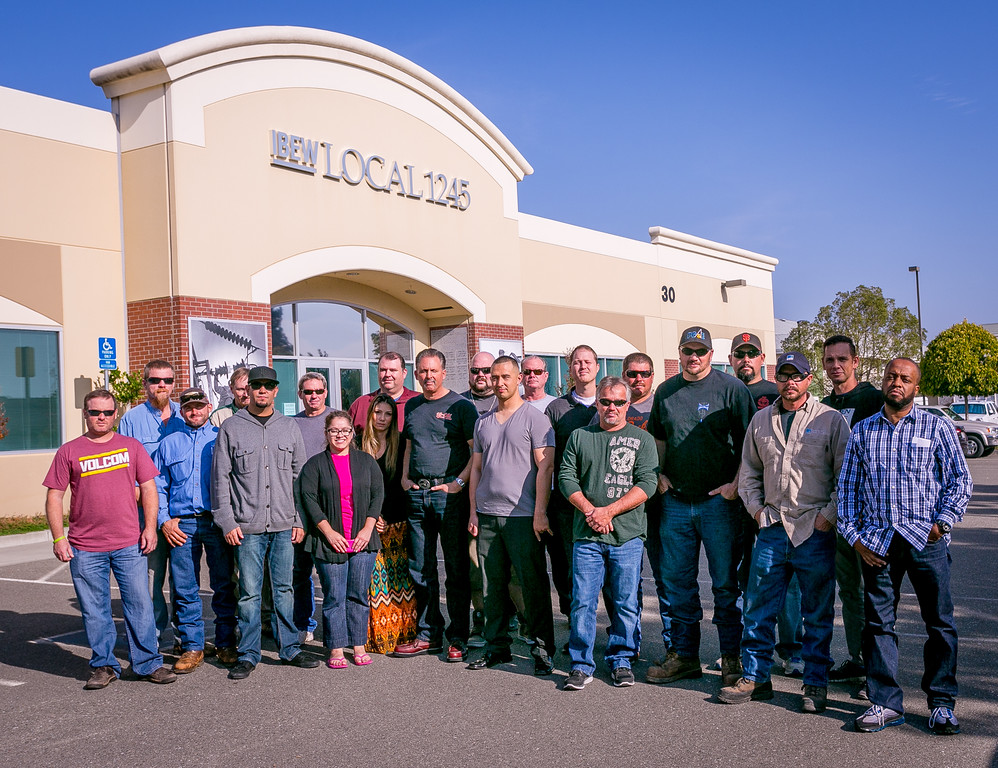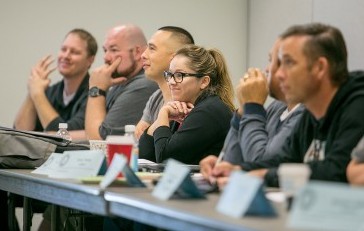Article by Rebecca Band
Photos by John Storey
Shop stewards are a critical part of every union. They are the first line of defense for union members, and it’s not always a walk in the park. It’s a major responsibility that can be tough and complicated. When there’s a termination, disciplinary action or other sort of issue at a worksite, the steward becomes a pivotal part of a multi-step process that can actually help save a fellow worker’s job. The precedent-setting work these stewards do can effect lasting change that has the potential to improve the job for other members in the future.
IBEW 1245 knows that our shop stewards provide an absolutely essential function, and serve as the fabric that keeps the union functioning as it should. Without quality stewards, the union wouldn’t be able to perform its core job – representing, protecting and defending its members. That’s why Local 1245 works hard to provide shop stewards with the training and resources they need to ensure they’re ready and able to jump into action when the time comes.
This year, Local 1245 took a new approach to steward training by providing a series of “Steward 101” classes that are specifically designed for new shop stewards. By giving these less experienced stewards extra time and additional details about policies, processes and procedures, the union can ensure that even the newest stewards have all the tools and skills they need to perform their steward duties as well as those with decades of grievance-filing experience.
The union hosted six “Steward 101” trainings this fall, giving nearly 100 novice stewards who attended the sessions a chance to learn, ask questions, and acquire all the skills and know-how they’ll need to be the best stewards they can be. The trainings were led by Assistant Business Manager Ken Ball, a former PG&E gas fitter and shop steward who has been on staff at Local 1245 since 1981.
“Back when I was a shop steward, things were pretty tumultuous,” Ball told the group, referencing the old grievance process that was far less effective and resulted in a major backlog. Ball has seen the evolution of the process and recognizes that it works best when stewards understand their role and know how it works. “I volunteered to lead these trainings because I enjoy doing this stuff. I’ve done it before for the other stewards, and I wanted to make sure we get all the new stewards trained up too.”
About two dozen PG&E shop stewards were in attendance at the final “Steward 101” session on November 6, with representatives from gas, electric and clerical. They came with varying levels of experience; some of the more seasoned stewards in the room have served for a few years and participated in various Local Investigating Committees, while others were brand-new to the process, having only been stewards for just a few weeks. They came from different worksites, divisions, backgrounds and experiences, but they all have one thing in common – they made the decision to step up and become stewards in order to provide help and support for their co-workers.
Ball kicked off the training by reviewing the all-important steps of the grievance procedure. He detailed all of the best practices for stewards, including things like credibility, timeliness, note-taking and duties of fair representation. In the afternoon, Ball discussed Weingarten Rights, sharing experiences and anecdotes where Weingarten has made a huge difference for members and their jobs. He also went over the Positive Discipline Agreement between the union and PG&E. Additionally, Ball mentioned different resources for stewards that are available online, and reviewed policies on workplace drug testing for the different departments, divisions and classifications at PG&E.
Ball looks forward to holding additional “Steward 101” classes as more new stewards come on board. To sign up for a future “Steward 101” class, email kmki@ibw1245.com.

